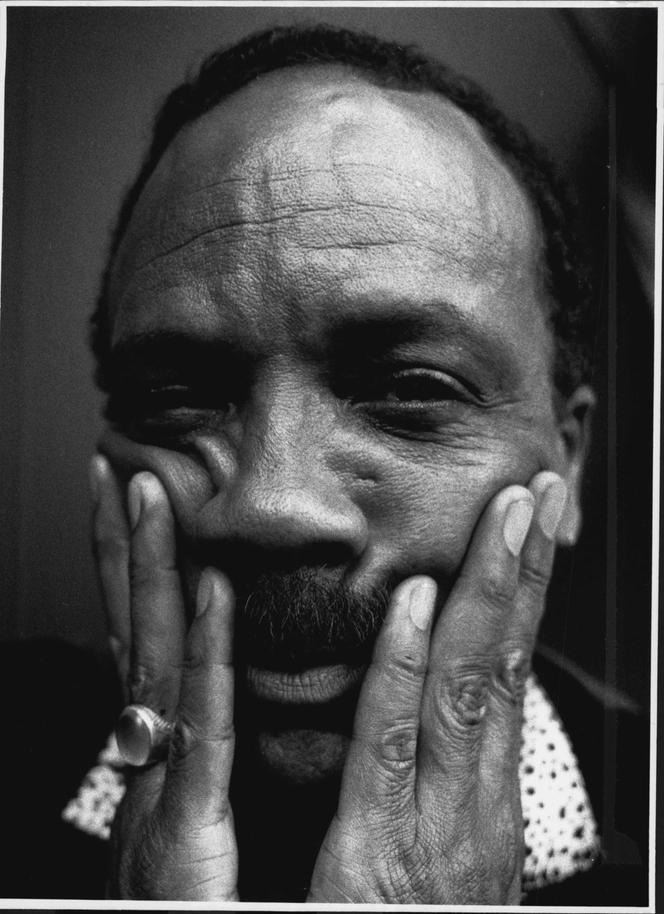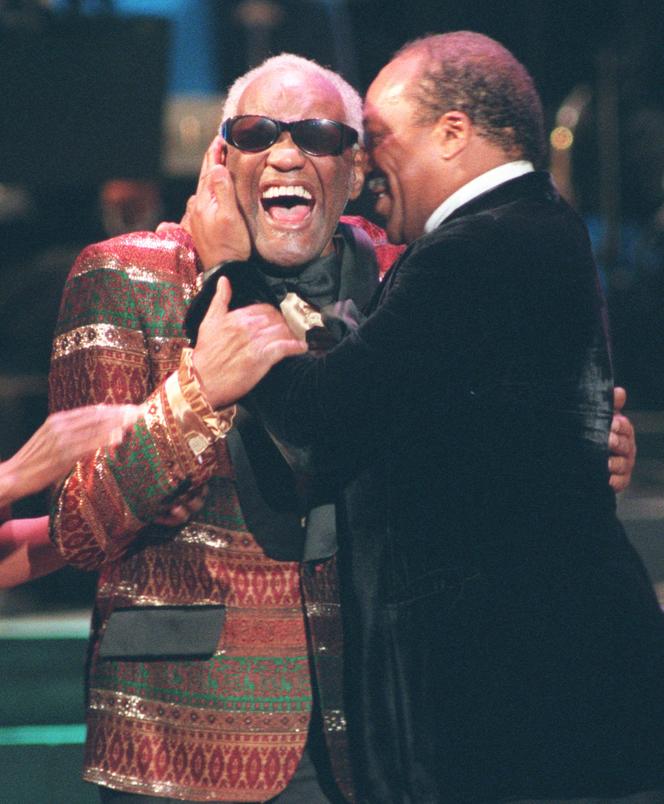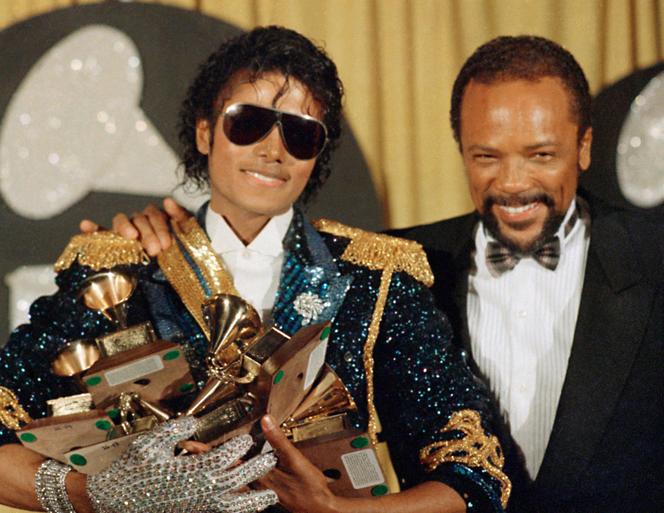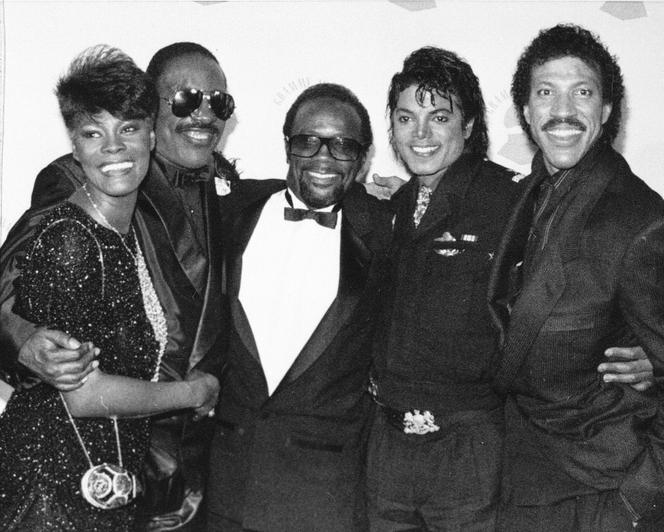


Among music producers, Quincy Jones, who died on November 3 in Los Angeles, California, at the age of 91, is one of the few known to the general public. The reason: his collaboration with Michael Jackson (1958-2009), particularly on the album Thriller, released at the end of November 1982. But when Jones shared the honors with Jackson at the Grammy Awards ceremony in February 1984, crowning the worldwide success of Thriller, musicians and industry professionals alike knew that the then 51-year-old already had a long career under his belt.
Starting out in jazz in the early 1950s, he was a trumpeter, conductor, arranger and composer, notably of dozens of film scores and TV theme songs, as well as producer of numerous recording sessions for jazz, variety, soul and pop stars. In July 2014, he confided to Le Monde's Francis Marmande: "I feel blessed, in the face of the formidable and fruitful journey that my life will have been. Growing up in the Chicago of the Great Depression didn't promise me much."
Born in Chicago, Illinois, on March 14, 1933, Quincy Delight Jones Jr first lived with his younger sibling on the South Side. His parents worked in a residential building for the African-American petit-bourgeoisie. In 1941, his mother was institutionalized following a serious schizophrenia attack – she died in 1999, but reappeared in Jones's life, between periods of calm and turmoil. The parents divorced and, in 1943, the father moved with his two boys to Bremerton, near Seattle in Washington state. The father's new partner soon joined them, along with her son and two daughters. The couple would have three more children.
In a recreation center, Jones, then age 11, discovered a piano. He had played a little during his childhood, listening to and singing the gospel tunes enjoyed by his grandmother and mother. It was a revelation, and beyond that, that music, as he writes in his 2001 autobiography Q: The Autobiography of Quincy Jones, would be "my destiny."
He began to teach himself piano, then trumpet. A teacher noticed his interest and gave him music theory lessons in exchange for babysitting his children. In 1947, the family moved to Seattle. He participated in the high school marching band. When pianist Count Basie's (1904-1984) band came to Seattle, Jones convinced trumpeter Clark Terry (1920-2015) to correct his mistakes. This marked the beginning of a long friendship with Terry and Basie. Jones was also part of a semi-professional orchestra led by vibraphonist "Bumps" Blackwell (1918-1985). Pianist and singer Ray Charles (1930-2004), also soon to become a close friend, played with them for a while.

In 1949, Jones turned to the Seattle-based orchestra of vibraphonist Lionel Hampton (1908-2002). Still too young to tour, he was hired into Hampton's wind section two years later. Meanwhile, he won a scholarship to the Schillinger House in Boston, Massachusetts, which became the prestigious Berklee School of Music in 1954.
From 1951 to 1953, Jones played in Hampton's big band and also became one of his arrangers. His composition "Kingfish" was his first recording for the band, in October 1951. This stint with Hampton enabled Jones to progress and make a name for himself. From 1954 to the end of the 1960s, he wrote hundreds of arrangements, he writes in his autobiography. These were for commercials, show tunes, little-known performers and stars alike. These included singers Dinah Washington (1924-1963, on 1955's For Those in Love) and Sarah Vaughan (1924-1990), trumpeter Dizzy Gillespie (1917-1993), Ray Charles (1930-2004) and Basie (1904-984). A peak, Basie One More Time, released in early 1959, was made up of compositions by Jones, including "For Lena and Lennie," which Claude Nougaro (1929-2004) adapted into French in 1977 under the title "Mon disque d'été." He also worked with Frank Sinatra (1915-1998), whom he met in 1958 and reunited with on several occasions (including It Might As Well Be Swing, in 1964, with Basie and his orchestra).
In the summer of 1955, Jones formed his own big band. Its debut album, This Is How I Feel About Jazz, was released in February 1957 by ABC-Paramount, followed by Go West, Man! in the tradition of Basie's swing style. In April 1957, he moved to Paris, hired by the Barclay phonographic company. For almost two years, he supervised most of the recording sessions with the in-house band. He made several visits to the pianist, conductor, composer and teacher Nadia Boulanger (1887-1979), to perfect his string writing, harmony and analysis of classical works.
Back in the United States in the early 1960s, Jones was hired by Mercury Records. His first pop hit, in 1963, was the production of "It's My Party," sung by the young singer Lesley Gore (1946-2015) and arranged by Claus Ogerman. At the head of his big band, he recorded Quincy Jones Plays the Hip Hits in 1963 and Golden Boy in 1964, the year in which he was appointed vice president of Mercury Records.
His contract allowed him to work for other companies. For Verve, in 1962, he recorded one of his most famous records, Big Band Bossa Nova, with the hit "Soul Bossa Nova." He reunited with fellow musician Charles for 1961's Genius + Soul = Jazz (Impulse!). In 1962, he produced Nana Mouskouri's The Girl From Greece Sings (Fontana), with an orchestra conducted by Torrie Zito. He won his first Grammy Award in 1964 for his arrangement of "I Can't Stop Loving You," from the Count Basie Orchestra's This Time by Basie! In his lifetime, Jones won 27 Grammy Awards, ranking third most behind conductor Georg Solti (1912-1997) with 31 and singer Beyoncé with 32.
In 1961, Jones composed his first film score, The Boy in the Tree, by Swedish director Arne Sucksdorff. But it was not until 1964 and the score for Sidney Lumet's The Pawnbroker that he became a regular composer for film and television. The most noteworthy are Sydney Pollack's The Slender Thread (1965), Norman Jewison's In the Heat of the Night from 1967 (Ray Charles sings the title theme), Peter Collinson's The Italian Job (1969), Richard Brooks's Dollars (1971) and, also in '71, Sidney Lumet's The Anderson Tapes. In 1967, the theme tune for the TV series Ironside became one of his classics.
In 1969, Quincy Jones left Mercury for A&M Records. He remained there until 1981, when his albums were released by his own company, Qwest Records, founded in 1980. Qwest Records is part of a group of companies that includes a music publishing catalog and a production and investment company for the entertainment industry (recording; television, including the series The Fresh Prince of Bel-Air, starring Will Smith; cinema; press; etc.). Qwest TV, an on-demand music video platform, was inaugurated in December 2017.
At A&M, Jones recorded his most accomplished albums, blending his jazz culture with soul, funk and pop. These included Walking in Space in 1969, Gula Matari in 1970, Smackwater Jack in 1971 and Body Heat in 1974. Also in '74, he suffered a brain aneurysm. He had to give up playing trumpet, touring with his orchestra and the intense pace of writing arrangements and compositions that had been his for the previous 20 years.
In 1978, he supervised the music for Sidney Lumet's film The Wiz, an adaptation of the musical itself inspired by The Wizard of Oz. Among the film's performers was Michael Jackson, who was preparing a fifth solo album and asked Jones to co-produce it. Off the Wall was released in August 1979, intertwining funk, disco, pop and soul. It was a critical success and a commercial tidal wave, selling almost 15 million copies in the months following its release.
The duo hit even harder with Thriller (November 1982), which spawned seven hit singles out of the album's nine tracks: "The Girl Is Mine," a duet with Paul McCartney; "Billie Jean"; "Beat It"; and "Thriller", to name just a few. Sales were astronomical, with nearly 40 million albums sold in the months of its release. Jones won a Grammy for Producer of the Year. The third and final step in the Jackson-Jones collaboration, Bad, was released in August 1987, with nine singles (including "I Just Can't Stop Loving You," "Bad," "The Way You Make Me Feel" and "Smooth Criminal") out of the 11 tracks on the album.

In early 1985, while working on the soundtrack for Steven Spielberg's The Color Purple, Jones was asked by singer Harry Belafonte and Ken Kragen, manager of Lionel Richie and Kenny Rogers, to take part in a project for the organization U.S.A. for Africa, to finance the fight against famine in Africa, particularly Ethiopia. Jones directed the recording sessions for the song "We Are the World," written by Jackson and Lionel Richie and featuring Diana Ross, Dionne Warwick, Stevie Wonder, Paul Simon, Ray Charles, Al Jarreau, Bruce Springsteen, Bob Dylan and Billy Joel. At the 1986 Grammy Awards, "We Are the World" earned Jones the Recording of the Year award.

Having released his last album in 1981, Jones triumphed again in 1989 with Back on the Block, which he liked to present as a summary of his approaches, from jazz to hip-hop. His greatest personal triumph came at the 1990 Grammy Awards, with six wins (out of seven nominations), including Album of the Year, Best Rap Performance, Best Jazz Fusion Performance for his version of Joe Zawinul's "Birdland" and Producer of the Year.
From the 1990s onward, Jones concentrated mainly on his business. He also put his reputation and address book at the service of charitable foundations (such as for AIDS research, cancer and help for victims of sexual assault) and youth education initiatives through his Quincy Jones Listen Up Foundation.
On July 8, 1991, for his first appearance at the Montreux Jazz Festival, he conducted the imposing orchestra playing music written by Gil Evans for Miles Davis decades earlier. This retrospective concert was to be one of the trumpeter's last, as he died at the end of September that year. Since then, Montreux regularly invited Jones. In 2008, he celebrated his 75th birthday, and in 2013 his 80th.
March 14, 1933 Born in Chicago, Illinois
1951-1953 Trumpeter and arranger in Lionel Hampton's big band
1957 First album under his own name, This Is How I Feel About Jazz
1957-1959 Works in France for the Barclay phonographic company
1962 Success of his album Big Band Bossa Nova
1963 First Grammy Award for arrangement of "I Can't Stop Loving You"
1969 Walking in Space album
1979-1987 Co-producer of three Michael Jackson albums, including Thriller
1989 Album Back on the Block
November 3, 2024 Death in Los Angeles, California
Translation of an original article published in French on lemonde.fr; the publisher may only be liable for the French version.
